Rare Luxury: 1986 Aston Martin Lagonda
If you’ve never had the opportunity to stand in front of an Aston Martin Lagonda, you have actually missed a slightly special experience. It really messes with your head just how low these are in the front. They also have a distinctive wedge styling, which while it wasn’t overly popular in the UK or the US, made them something of a favorite in the Middle East. This example is one of only 645 cars that were built during the Lagonda’s 14-year production run. Located in Pasadena, California, it is listed for sale here on eBay. The owner has set the listing to open at $44,000, but there are currently no bids on the car.
When it came to styling and engineering, Aston Martin had a tendency to bite off more than it could possibly chew, and then chew like mad to achieve their goals. Nowhere was this more apparent than in the Lagonda. Their stated aim was to build the lowest, sleekest 4-door saloon car on the planet. They locked in the design of the car, but nobody had thought to check whether the engine would physically fit under the hood. Not wishing to compromise on the car’s appearance, they worked a solution that was initially neither elegant nor reliable. However, they did maintain the styling objective, and the Lagonda certainly stands out. At some point prior to 2005, this Lagonda has undergone a repaint. It isn’t entirely clear what the original color was, but the Cheltenham Beige that now graces the Lagonda’s panels wasn’t introduced until 1989. The paint itself isn’t too bad, although there are a few marks now present. Apart from a missing center cap off the driver’s side rear wheel, the outside of the car appears to be complete, with all of the trim and glass in good condition.
In a bid to provide the most luxurious and sumptuous interior possible, many trees and cows laid down their lives to provide the material for the trim and upholstery in the Lagonda. This all remains in good condition, and while the floor mats that are currently in the car aren’t original, the owner does still retain the original woolen items, which are also in good condition. The dash of the Lagonda was one of the features of the car when it was released. It had a real sci-fi look to it, with touch switches and a vacuum-fluorescent display. Sadly, that display, which did have a reputation for being unreliable, has lived up to that reputation in this car. The display has been replaced by the previous owner with Dakota Digital gauges. A full replacement vacuum-fluorescent display and all of the associated electronics are included with the sale. All you need to do is to locate someone who is brave enough to fit it. Actually, the electronics for the Lagonda make an interesting story within themselves. Aston Martin was grimly determined to use the fledgling vacuum-fluorescent technology and its associated electronics, no matter what. By the time the first car finally rolled off the line, the cost of developing the technology had far exceeded to original development budget for the whole car! Then to add insult to injury, when that first car did roll out of the factory, the first thing that happened was that it suffered a complete failure of all of its state-of-the-art electronics.
Under the hood of the Lagonda is the 5.3-liter V8 engine which was designed by Tadek Marek. In various forms, this engine saw three decades of service in various Aston models. For the Lagonda though, they faced an interesting dilemma. Remember my earlier reference to the low hood-line? Well, the engine didn’t fit under it. The company was unwilling to compromise the car’s styling, so the decision was made to modify various aspects of the engine’s intake and plumbing in a bid to make it fit. They succeeded in this, but this creative engineering did come at a price. The original engine produced around 390hp. By the time the engine had been squashed into the engine bay of a Lagonda, power had dropped to under 300hp. This then found its way to the rear wheels via a 3-speed automatic transmission. Early cars were very prone to overheating issues and fuel vaporization problems, but ongoing development, many of these motivated by repeated warranty claims, allowed Aston Martin to eventually engineer solutions to these problems. Sadly, it was a very slow process that did the car’s reputation no real good. This particular car doesn’t get regular use now, but it does appear as though it does drive okay.
If you were to compile a list of the 100 most interesting cars ever built, the Aston Martin Lagonda would probably feature on that list, because it is an interesting car. As a styling and engineering exercise it was also an incredibly brave one. Early Lagondas had a pretty appalling reputation for reliability, or more accurately, a lack of reliability. By the time this car was built the vast majority of those bugs had been eliminated, but that sophisticated display could still be troublesome. With a Lagonda, the key to their value lies in their originality. While I will say that this is a very nice looking car, the possibility that it has been repainted in a non-original color, combined with the lack of the original display, both conspire to negatively impact the value. Having said that, it is also possible that the change to Dakota Digital gauges might actually bless the car with improved reliability. I guess that this means that the next owner might be faced with the choice of whether they would prefer originality or reliability.
Auctions Ending Soon
 2002 Subaru Impreza WRXBid Now12 hours$333
2002 Subaru Impreza WRXBid Now12 hours$333
 1975 Chevrolet Corvette ConvertibleBid Now13 hours$4,000
1975 Chevrolet Corvette ConvertibleBid Now13 hours$4,000
 1964 Ford F-100 Camper CustomBid Now14 hours$2,000
1964 Ford F-100 Camper CustomBid Now14 hours$2,000
 2006 Jeep Wrangler SportBid Now2 days$11,000
2006 Jeep Wrangler SportBid Now2 days$11,000
 1974 Datsun 260ZBid Now4 days$750
1974 Datsun 260ZBid Now4 days$750
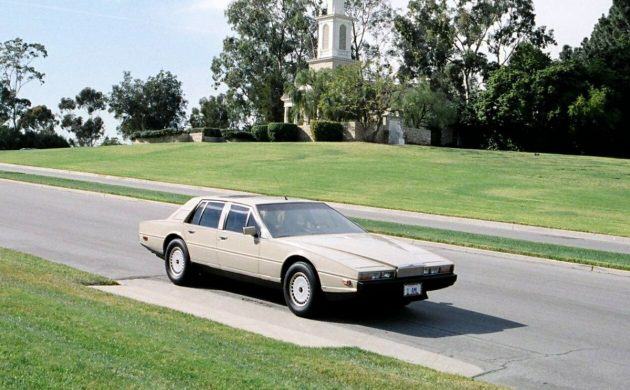
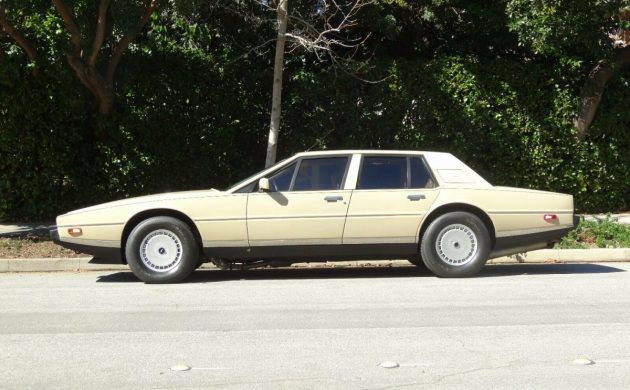
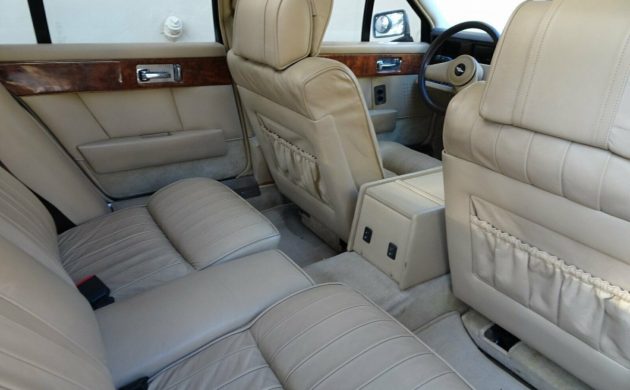
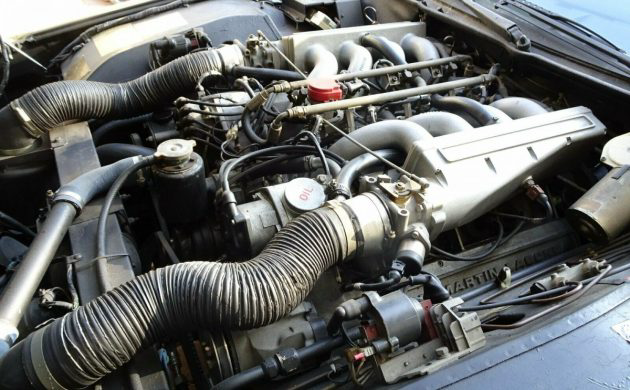
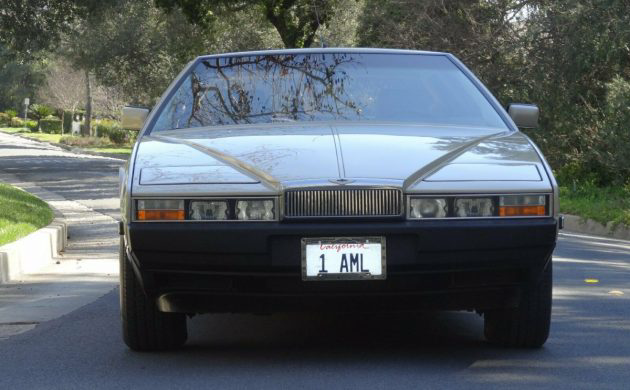

Comments
Always thought these were cool, but the color does not compliment that coolness.
Barn find?
Did you use the word Repainted? There might be hope for you yet!
To me the front end, in profile, resembles an aardvark. This car just looks a bit odd. Aston Martin has almost always made great looking cars, I’m not so sure about this one.
Steve R
First issue – it’s a TMU car with non-op a/c and non-op rear window motors…in California being sold as the temperatures are climbing to triple digits?! Another interesting bit of information is that last time vehicle passed smog was Sept 2017. California requires cars to be smogged every 2 years, sort of coincidence that the car is up for sale just a few months before smog inspection is due to complete up coming registration. Is the paint which according to the seller is not perfect. What we are looking at is a $25k car on a good day.
Tirefair , you are quite generous with you estimate of this car’s worth. IMHO
Lance, while I couldn’t find any immediate classified ads for Lagonda state side, there’s a handful for sale in the uk all for around £80k which is close to $120k. Of course this particular car is not even remotely close to that price level but what do you think it’s worth?
This is what happens when a Seville and a Trans Am have sex…..
This car came along about 3 years too soon. Rappers were still trying to amass a fortune to rap about in 1986.MC Hammer was still a year or two away.Otherwise,this beast would’ve gotten an unexpected marketing boost from being name-checked in a song and/or from an appearance in an over-the-top music video. I can see it even now: “I went from Honda…to Lagonda like a phat ballin’ playah!”
(i like this freaky evolutionary dead-end btw)
This model was produced from 1976 until 1990.
Loved the rhyme! Jay Z hadn’t contacted you yet!
Evel had one with a Big Block Chev and side pipes..
I’ve always had a soft spot for these. Never soft enough to touch one though. Purists will hate me, but I wonder how an LS, overdrive A/T version would go.
I wondered the same thing.
There was one for sale a year or so ago that pretty much had a full Town Car driveline swapped into one, 4.6 and the trans and everything.
Believe it or not, these cars saved Aston Martin from financial ruin. Read “Swift Running” by Peter Sprague.
It’s a love it or hate it design. Replacement of gauges is essential in these cars.
There are at least two of these sedans cut down to be two-door coupes. The modifications are extensive, but the proportions and appearance of the car really improve. One of the two is a factory-modified prototype “Mule” used for the development of the Virage.
All the talk about the dash but no photos.
I was at the factory and have pictures of engine no. 0001 being built. scared of the early digital guages, but loved the car.
I’ve heard of the Aston Martin Lagonda, but I’ve never seen one in person. From some angles, it looks quite attractive. From other angles, it looks absolutely hideous. I wish I could say that I like the taillamps. They make the rear look awful.
Stay away from any Brits cars that has the Lucas electric/electronics! The old joke: Why do the Brits like warm beer? Because the have Lucas refrigerators! To me, these cars are nice looking and had the fortune to ride in one! The only mis-fortune was that we (4 of us) had to push a piece of British Steel for 4 miles to my friend’s house to get it running again. Never again AM! A.M. probably got some of their designers from A.M.C. of Gremlin, Pacer, Matador fame?
These were built for the Middle East market, where they sold well.
This is the kind of car teenagers have wet dreams about (I know I did when I was one in 1976) Meanwhile, actual owners have nightmares.
Search the internet and you will find pictures of at least two of these that were cut down to be 2-door coupes. The difference is striking, and the proportions of the car become much more attractive. I doubt it would be worth the cost of course, unless you somehow managed to get a hold of the shortened “Mule” that Aston Martin used to develop the Virage.
Between the front and rear wheels, it reeks of GM styling.
$44k? The seller is hopelessly optimistic. A poor quality repaint in a yawn-inducing color on a notoriously unreliable, & unpopular car. Drop that asking price to $25k